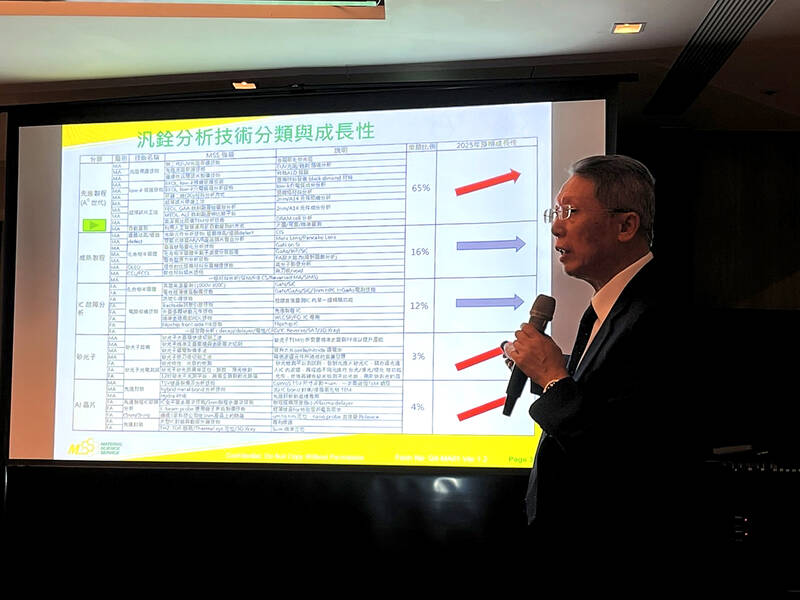Msscorps Co (汎銓科技), which provides advanced semiconductor materials and failure analyses to semiconductor firms, said its US subsidiary, MSS USA Corp, opened its first advanced lab in Silicon Valley yesterday, to serve US customers from Apple Inc to Nvidia Corp, Applied Materials Inc and Lam Research Corp.
“It reflects our commitment to being close to our customers to help support the US semiconductor ecosystem and contribute to this fast-growing environment,” MSS USA Corp CEO Gene Leou (柳淳浩) said at the opening ceremony attended by representatives of the company’s major US customers.
As the US is encouraging new semiconductor investments and introducing new industrial policies, MSS is “glad to be part of this momentum and to help our customers build future technologies,” Leou said.

Photo: Grace Hung, Taipei Times
Msscorps said its US subsidiary is expected to start generating revenue next month and that it estimated its overseas sales would double from last year.
It also plans to set up a lab in Japan in August and in Europe by the end of this year, Msscorps said.
The company saw a quarterly loss of NT$48.87 million (US$1.61 million) last quarter, compared with a net profit of NT$23 million the previous quarter. That was the worst quarterly performance since Msscorps’s debut on the local stock market in August 2022.
The company posted losses per share of NT$0.94 last quarter, compared with earnings per share of NT$0.4 the previous quarter, while gross margin dipped from 27 percent to 13 percent.
Msscorps chairman Gino Leou (柳紀綸) on April 28 said the first quarter was the worst period and that he expected business to rebound in the following quarters.
He attributed the weak performance to lower-than-expected demand for material analysis and fewer working days in February.

DIVIDED VIEWS: Although the Fed agreed on holding rates steady, some officials see no rate cuts for this year, while 10 policymakers foresee two or more cuts There are a lot of unknowns about the outlook for the economy and interest rates, but US Federal Reserve Chair Jerome Powell signaled at least one thing seems certain: Higher prices are coming. Fed policymakers voted unanimously to hold interest rates steady at a range of 4.25 percent to 4.50 percent for a fourth straight meeting on Wednesday, as they await clarity on whether tariffs would leave a one-time or more lasting mark on inflation. Powell said it is still unclear how much of the bill would fall on the shoulders of consumers, but he expects to learn more about tariffs

NOT JUSTIFIED: The bank’s governor said there would only be a rate cut if inflation falls below 1.5% and economic conditions deteriorate, which have not been detected The central bank yesterday kept its key interest rates unchanged for a fifth consecutive quarter, aligning with market expectations, while slightly lowering its inflation outlook amid signs of cooling price pressures. The move came after the US Federal Reserve held rates steady overnight, despite pressure from US President Donald Trump to cut borrowing costs. Central bank board members unanimously voted to maintain the discount rate at 2 percent, the secured loan rate at 2.375 percent and the overnight lending rate at 4.25 percent. “We consider the policy decision appropriate, although it suggests tightening leaning after factoring in slackening inflation and stable GDP growth,”

Greek tourism student Katerina quit within a month of starting work at a five-star hotel in Halkidiki, one of the country’s top destinations, because she said conditions were so dire. Beyond the bad pay, the 22-year-old said that her working and living conditions were “miserable and unacceptable.” Millions holiday in Greece every year, but its vital tourism industry is finding it harder and harder to recruit Greeks to look after them. “I was asked to work in any department of the hotel where there was a need, from service to cleaning,” said Katerina, a tourism and marketing student, who would

Meta Platforms Inc offered US$100 million bonuses to OpenAI employees in an unsuccessful bid to poach the ChatGPT maker’s talent and strengthen its own generative artificial intelligence (AI) teams, OpenAI CEO Sam Altman has said. Facebook’s parent company — a competitor of OpenAI — also offered “giant” annual salaries exceeding US$100 million to OpenAI staffers, Altman said in an interview on the Uncapped with Jack Altman podcast released on Tuesday. “It is crazy,” Sam Altman told his brother Jack in the interview. “I’m really happy that at least so far none of our best people have decided to take them